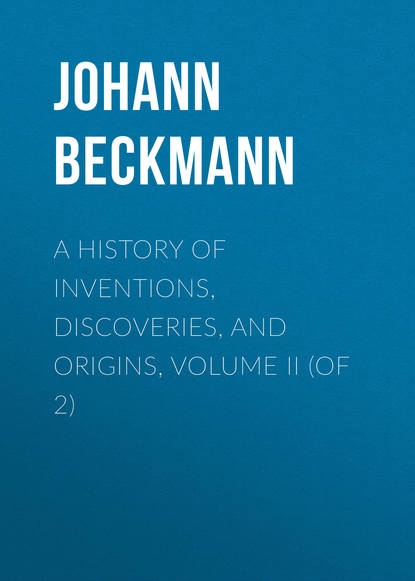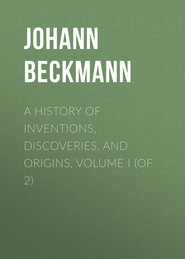По всем вопросам обращайтесь на: info@litportal.ru
(©) 2003-2024.
✖
A History of Inventions, Discoveries, and Origins, Volume II (of 2)
Настройки чтения
Размер шрифта
Высота строк
Поля
Tavernier.
1188
Dampier. Also the Gentleman’s Mag. 1770, p. 564.
1189
Wafer, p. 118.
1190
To this subject belong the following works: – Ars Magna Artilleriæ, Auct. Cas. Siomienowicz. Amst. 1650, fol. p. 61. The author thinks that the nitrum of the ancients is not at present known.
Natural History of Nitre, by W. Clarke. Lond. 1670, 8vo. It is here said that the nitrum of the ancients was impure saltpetre, and that the latter is produced from the former by purification.
G. C. Schelhameri de Nitro, cum veterum, tum nostro commentatio, Amst. 1709, 8vo, contains good philological observations, particularly in regard to the period, but leaves the question undetermined.
Saggi sul ristabilimento dell’ antica arte de’ Greci e Romani pittori, del Sig. Doct. Vin. Requeno. Parma, 1787, 2 tomi in 8vo, ii. pp. 95, 131: a learned but diffuse work. He thinks that the nitrum of the ancients was our saltpetre; and what others consider as proofs of its being mineralized alkali, he understands as indicating alkalized saltpetre. I am not, however, convinced. Before I ascribe to the ancients a knowledge of our saltpetre, I must be shown in their writings properties of their nitrum sufficient to satisfy me that it was the same substance.
Commentat. de nitro Plinii, in J. D. Michaelis commentationes. Bremæ 1784, 4to. The author only illustrates the account of Pliny, and states what, according to his opinion, we are to understand in it in regard to alkali, and what in regard to our saltpetre.
1191
[Since the discovery of the immense deposits of nitrate of soda in Peru, this salt, from its being much cheaper, has replaced the nitrate of potash in the manufacture of aquafortis, but it is not adapted to the making of gunpowder owing to its deliquescent property.]
1192
I found the account of the Portuguese saltpetre in Mémoires Instructifs pour un Voyageur. The author of this work was the well-known Theodore king of Corsica.
1193
More accounts of native saltpetre may be found in Recueil de Mémoires sur la Formation du Salpetre. Par les Commissaires de l’Academie. Paris, 1776, 8vo. Del Nitro Minerale Memoria dell’ ab. Fortis, 1787, 8vo.
1194
The first, or one of the first, who was acquainted with and made known the cubic saltpetre, was professor John Bohn of Leipsic, in the Acta Eruditorum, 1683, p. 410; but with more precision in his Dissertat. Chymico-Physicæ, Lips. 1696, 8vo, p. 36.
1195
[It is scarcely necessary to inform the reader that the author understands the soda of commerce, which is a carbonate of soda, and not the hydrated or caustic soda of chemists.]
1196
[Crude soda or kelp was formerly manufactured to a very large extent in the Highlands, by burning the sea-weed, but since the tax has been taken off salt, most of the soda of British commerce is made by decomposing this with chalk and some carbonaceous matter.]
1197
In like manner, a heap of dung covered with earth is lixiviated, and the result, without the addition of ashes, used as saltpetre.
1198
The passage of Jerome relating to Proverbs, xxv. 20, I here insert entire, because I shall often have occasion to employ it: – “Nitrum a Nitria provincia, ubi maxime nasci solet, nomen accepit. Nee multum a salis Ammoniaci specie distat. Nam sicut salem in litore maris fervor solis conficit, durando in petram aquas marinas, quas major vis ventorum, vel ipsius maris fervor in litoris ulteriora projecerit; ita in Nitria, ubi æstate pluviæ prolixiores tellurem infundunt, adest ardor sideris tantus, quod ipsas aquas pluviales per latitudinem arenarum concoquat in petram; salis quidem vel glaciei aspectui simillimam; sed nil gelidi rigoris, nil salsi saporis habentem, quæ tamen, juxta naturam salis, in caumate durare, et in nubilos, aere fluere ac liquefieri solet. Hanc indigenæ sumentes servant, et ubi opus extiterit, pro lomento utuntur. Unde Judæo peccanti dicit propheta Jeremias: Si laveris te nitro, et multiplicaveris tibi herbam borith, maculata es in iniquitate tua, dicit Dominus Deus. Crepitat autem in aqua quomodo calx viva; et ipsum quidem disperit, sed aquam lavationi habilem reddit; cujus natura cui sit apta figuræ, cernens Solomon ait: Acetum in nitro, qui cantat carmina cordi pessimo. Acetum quippe si mittatur in nitrum, protinus ebullit.”
1199
Herodot. ii. cap. 86 et 87.
1200
Histor. Ægypti Naturalis iii. 2. See also Forskäl Flora Ægyptiaco-Arabica, p. xlv.
1201
[Duhamel proved soda to be distinct from potash in 1736, Marggraf confirmed it in 1758.]
1202
Lib. xxxi. cap. 10.
1203
De Simplic. Med. Facult. ix. Dioscorides also, v. 131, speaks as if it had been well known that nitrum was commonly burnt.
1204
Phil. Transactions, 1771, vol. lxi. p. 567.
1205
De Igne, p. 435, ed. Heinsii, where he speaks of the heat produced in lime by slaking it. Aristotle also mentions together κονία and νίτρον, on account of similar properties. Problemat. i. 39. ed. Septalii, p. 71.
1206
Hist. Plant. iii. 9, p. 50.
1207
xxvi. 8.
1208
xiv. 20.
1209
De Re Rustica, lib. i. c. 7. Little, however, depended on the wood; the principal thing was the sprinkling with water.
1210






